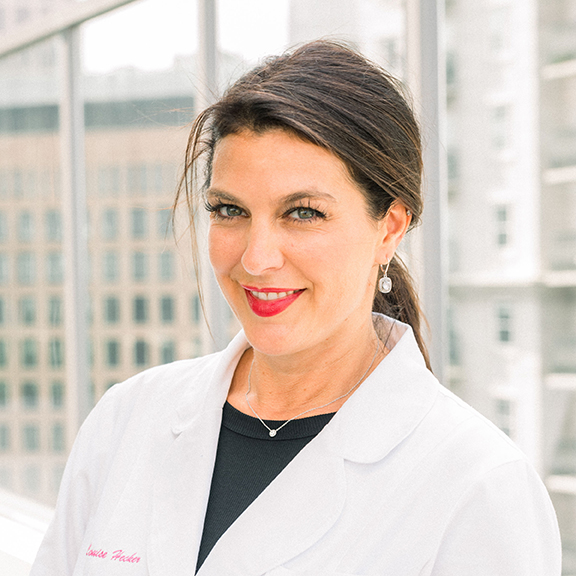Louise Hecker
Associate Professor of Medicine, Emory University Department of Medicine, Division of Pulmonology, Allergy, Critical Care, and Sleep Medicine; Research Scientist, Department of Atlanta Veterans Affairs; Georgia Research Alliance Distinguished Investigator

You could say that Louise Hecker breathes easier because she is helping others do the same as a leading researcher in regenerative biology who specializes in pulmonology.
Over time, the body’s normal physiologic repair responses can, in Hecker’s words, “go awry, contributing to the pathogenesis of age-dependent lung diseases.” Genetics and environmental factors play a role as well.
Think about it this way. The effects of oxidation on a car are plain to see: rust and corrosion. Excessive oxidant generation leads to oxidative stress, which plays a similarly damaging role in the body, leading to life-limiting and sometimes fatal conditions. Fibrosis is the clinical term for scar tissue. Nearly half of deaths in the US annually are attributed to oxidation-induced fibrotic disorders, though the official cause of death is often listed as “organ failure.”
Stopping oxidative stress is the goal, and Hecker reached a major milestone in 2009 when she and her colleagues published a breakthrough paper in Nature Medicine. In it, they identified the role of Nox4 (NADPH oxidase-4), an oxidant-generating enzyme, in creating scar tissue in the lungs. Hundreds of studies have confirmed her findings in nearly all organs that scar; today, Nox4 is considered among the best validated causes of fibrotic disease.
Although existing antioxidants provide some help, they are no cure. Hecker likens their use to trying to mop up a still-overflowing sink. A Nox4 inhibitor would turn the water tap off, solving the problem by targeting its source.
Hecker’s foray into this research began when she noticed a nifty feature of amphibians: their ability to regenerate cardiac tissue. Since then, she has studied how different animals regenerate tissue in a variety of organs, from lungs to skin.
Hecker joined Emory in fall 2020 from the Department of Medicine at the University of Arizona. Given the strength of her research—which has been funded by the BIO5 Institute, the National Institutes of Health, and the US Departments of Defense and Veterans Affairs—the Georgia Research Alliance (GRA) supported Hecker’s appointment at Emory, naming her Distinguished Investigator.
“I moved to Emory because there is a rich community of people doing preclinical drug research here. I am excited to have new people on board, new eyes on the project, and the momentum to take this to the next level to benefit patients,” says Hecker.
To that end, the patience of saints is nothing alongside that of a determined scientist. Hecker and her teams have screened around 35,000 compounds to date. When they identify what they call “hits,” those go to the medicinal chemists, who alter side chains and pieces of that compound. Hecker then tests to see which ones work better, with fewer side effects.
Hecker’s goal: To stop Nox4, which becomes dysfunctional in aging, in its tracks and develop improved therapies that would help the elderly, and others afflicted by fibrotic disorders, lead longer and healthier lives.
In 2011, just three years out from earning her PhD in applied physics at the University of Michigan, Hecker founded and serves as chief scientific officer of Regenerative Solutions, which provides highly specialized preclinical testing services for biotechnology and pharmaceutical companies with drug-development platforms in pulmonary fibrosis. Eight years later, she founded Fibronox, where she also serves as chief scientific officer. Through this pharmaceutical startup, she hopes to apply her research to produce viable human therapies.
“It’s not just about the science,” Hecker emphasizes. “Emory has a focus on being an academic entrepreneur, which is important to me. For us to develop therapies, it’s also about developing a product.”
Research Interests
- Acute respiratory distress syndrome (ARDS)
- Duchenne muscular dystrophy
- Idiopathic pulmonary fibrosis
Award Highlights
- Innovator of the Year Award, Arizona Governor’s Celebration of Innovation
- Inventor of the Year, Tech Launch Arizona
- Business Pitch competition winner at Science2Startup, an invitation-only symposium that connects world-class discoveries from leading research institutions with top biotech investors